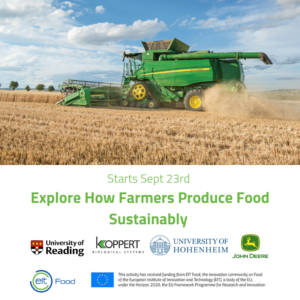The course will focus on:
– What ‘sustainability’ means and how it applies to farming;
– How crops are grown in the EU – both arable and horticultural;
– How livestock is farmed in the EU to produce meat, dairy products and eggs;
– The challenges of feeding a rapidly expanding global population;
– The trade-offs involved in financially viable organic, environmentally sustainable and socially acceptable production methods;
– Which technologies are providing the most sustainable solutions.
Timeline
The course will have multiple runs in 2019 and 2020, starting on the 23rd of September 2019.

Learning objectives and Outcomes
Once completed, participants will be able to:
– Develop an informed and balanced understanding of the complexities of sustainable food production in the EU within the context of the global food supply chain
– Investigate how food is produced by EU farmers and explore the trade-offs required when considering organic, environmentally sustainable and socially acceptable production methods
– Reflect on the challenges faced by farmers and how innovative technologies help them to provide a secure and sustainable food supply for a growing population
– Evaluate the benefits of different farming methods and apply what you’ve learned to your food-buying choices and working priorities.
How to join the course
This course is available on FutureLearn





